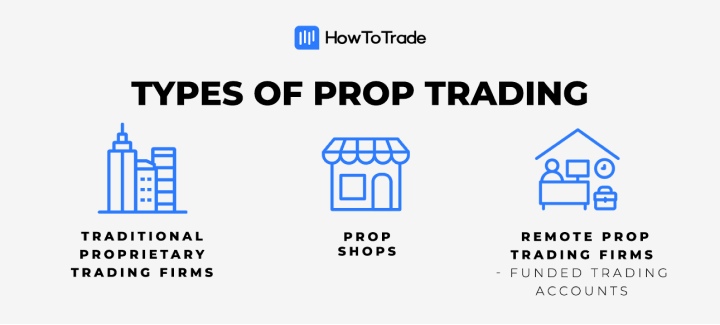
15 mins read • 23 Jun 2022
Every day, thousands of talented traders around the world enter the realm of proprietary trading. There, they have an opportunity to build a career buying and selling shares, futures, forex, and crypto products.
Read on to learn more about prop trading and how proprietary traders make a good living in the financial markets.
Proprietary trading is the act of a company (prop firm) hiring third parties (prop traders) to trade their (the firm's) own money. The prop firm allocates risk capital to the prop traders; in return for their services, traders are awarded a profit split.
To determine trader acuity, the proprietary trading firm follows a qualification process. Let's follow the journey of an average retail trader (Trader A) and their transition to becoming a professional prop trader:
Unlike a hedge fund or investment bank, prop trading is all-inclusive. If you are a talented trader, you can build a career buying and selling financial instruments. Pass the challenge, receive a funded account, and you're in. Simple as that.
Prop firms come in all shapes and sizes. However, there are three main types of these outlets: traditional prop firms, prop shops, and funded trading accounts. Each is unique and specializes in certain areas of the proprietary trading space.

A prop shop is a firm where the trader puts up a significant amount of risk capital. Prop shops offer traders market access and additional purchasing power. A positive track record is ideal for candidates, although no formal qualifications are required.
The top proprietary trading firms are found online in the global macro trading environment. Remote prop trading firms offer talented individuals the ability to earn a funded trading account.
No qualifications, experience, or capital are required. Anyone can earn a funded account and trade it remotely from home or office. Many of the best prop trading firms in the world furnish remote traders with funded accounts.
Although both prop firms and hedge funds manage large quantities of capital, there are several key differences between the two. Below are three of the largest:
Prop trading opens the financial markets to the masses. Regardless of one's background, education, and experience, it's possible to profit from prop trading. In many ways, the prop industry democratizes the global marketplace by funding anyone with the trading skills to consistently profit.
The Volcker Rule states that investment banks and some financial firms cannot trade securities, derivatives, commodities, futures, and options for their accounts. It defines this act as being proprietary trading. Accordingly, the rule limits interactions between banks and hedge funds, prop firms, and private equity funds.
The Volcker Rule stemmed from the Global Financial Crisis of 2008. Upon the bursting of the subprime mortgage bubble and subsequent credit freeze, steps were taken to limit the trade of securities by banks.
If you're a prop trader, then the proprietary trading firm is your partner in the marketplace. So, it makes sense to focus your business on only the best proprietary trading firms. That's why we believe the ecosystem at HowToTrade is head-and-shoulders above the rest.
At HowToTrade, we furnish aspiring prop traders with the education, market analysis, and support they need to build a career in the markets. Featuring video tutorials, around-the-clock analysis, HowToTrade is your all-in-one place for trading education.
A funded trading account is a platform that allows participants to trade real money in the live markets. It consists of an allocated amount of risk capital, risk controls, and market access. With a funded account, prop traders can profit from buying and selling everything from forex pairs to the world's major stock market indices.
When traders receive a funded account, they are free to engage the live market as they see fit. As long as risk control parameters aren't violated, the account will remain live. If profitable, the trader will reap the rewards of their hard work.
Traders are free to shoot for the stars with funded prop trading accounts. Even though many account sizes are designed for smaller traders, advanced alternatives exist. In fact, it's not unheard of for individuals to secure $100K, $500K, $1 million, or $2 million accounts.
In the modern prop environment, it's possible to secure an account upwards of $1 million. This amount of purchasing power is beneficial in many ways. First, it allows for larger position sizes and the generation of extraordinary returns. Second, having adequate equity gives the trader added staying power in the face of market volatility. Third, it furnishes traders with many more scalping, day, and swing trading strategic opportunities.
Of course, larger account sizes typically require enhanced audition fees and sophisticated risk management. Due to these two elements, they are recommended for proven, experienced traders.
A proprietary trading firm funds market-savvy individuals with the purchasing power they need to profit in the live market. To determine the affinity of aspiring traders, prop firms use evaluation periods complete with profit targets and risk controls.
Upon a person satisfying the evaluation framework, the prop firm assigns them a funded account. The prop firm then distributes trader profits according to a predetermined split. In this fashion, firms help solid traders earn a living while boosting their bottom line.
One of the best things about modern prop trading is that anyone with talent can earn a funded trading account. It's possible in three basic steps: pass the challenge, get funded, and begin trading in the live market. That's it — no advanced degree, coding skills, or experience required.
However, in order to become a funded trader, you must first prove that you have what it takes to be consistently profitable. To do so, you must pass the prop firm's challenge. A challenge typically consists of three elements:
The challenge is your audition to become a funded trader. It aims to determine if you and your strategy can make money while managing risk over time. Although you don't need a Ph.D. to be a prop trader, you must pass a challenge.
One of the most significant advantages of proprietary trading is the flexibility in the amount of risk capital a trader can qualify for. Amounts range anywhere from $25,000 to upwards of $1,000,000, depending on the firm and financial institutions involved. Generally, greater purchasing power requires enhanced audition fees.
Variable funded account sizes constitute a significant benefit for aspiring prop traders. Traders can grow into their careers at their speed. For beginners, small accounts are ideal due to their limited fees and realistic profitability metrics. However, as the trader grows, many prop trading firms reward success with larger accounts and purchasing power. Many of these advanced accounts are in excess of $1 million.